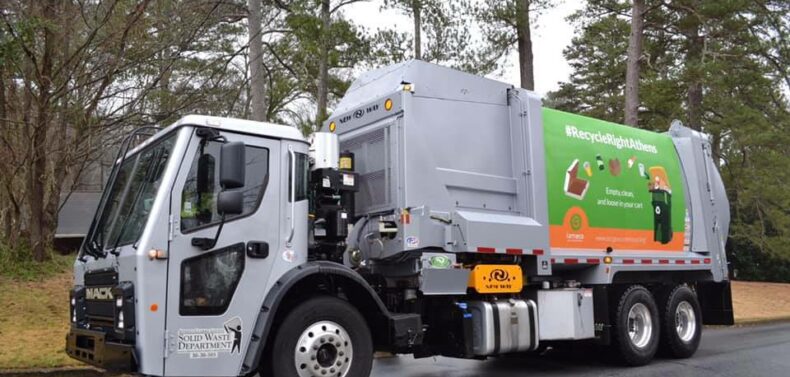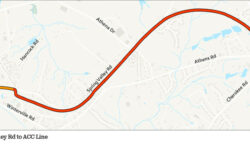Athens-Clarke County officials are considering a new way to regulate trash and recycling pickup in suburban and rural parts of the county that would restrict how many trucks come through a neighborhood.
Currently, single-family residents inside the old city limits (the Urban Service District) are served by the ACC Solid Waste Department, while those in what used to be unincorporated Clarke County (the General Service District) have their choice of several private haulers or can haul their own trash to the landfill. This dual system was set up during city-county unification in 1990 because many county residents wanted to keep their ability to choose.
“In many communities, trash is the last utility they have control over, or perceived control over,” Solid Waste Director Suki Janssen told the commission’s Legislative Review Committee last week. “It can be a very difficult conversation.”
In 2012—after some residents got fed up with poor service provided by one hauler—the commission went to what was then called a franchise system that capped the number of private haulers and required them to obtain a permit from the ACC government to operate. But the term franchising is a misnomer, according to Janssen.
“We are not franchising, y’all. It’s an old term. We are permitting those five haulers. We allow them to operate in the general service district with very minimal oversight,” she told the five-member committee.
A true franchising system like Gwinnett County’s would involve putting trash pickup out for bid and choosing one or two companies, Janssen said. But ACC’s Solid Waste Advisory Committee did not want to put any of Athens’ private haulers out of business, so it recommended dividing the General Services District into zones, with one hauler responsible for each zone.
The advantages of such a system are: fewer trucks coming down neighborhood streets, so less noise and fewer emissions; greater control over pricing and customer service; less waste going into the landfill and less illegal dumping. The biggest disadvantage is that GSD residents could no longer choose a hauler.
“If they’re unhappy with customer service, why don’t they just pick another hauler?” asked Commissioner John Culpepper, advocating for a free-market approach.
“People have short memories,” Janssen replied, so that doesn’t always work. When haulers lose customers over poor service, they simply lower prices and win them back, she said. In addition, some feel “trapped” by high fees to cancel service, she added.
Janssen said that private haulers are in favor of zoned franchising because concentrating customers in a small geographical area makes their business more profitable. It would also eliminate self-hauling, which is a small but very vocal group of people who haul their own trash.
“The customers that get most upset are the ones that typically have no service and want to do with their trash what they want to do with it,” she said. “They get very angry, and it would often come back on staff.”
However, many of those people dump their trash illegally in apartment complexes’ trash receptacles, especially on the Eastside. Janssen compared such dumping to theft because it forces commercial and multifamily customers to pay more for extra pickups.
Commissioner Ovita Thornton raised concerns about costs. Currently ACC trash pickup is a bit more expensive than private services—about $18 to $61 a month versus $10 to $39, depending on the size of rollcarts—but private haulers charge extra for recycling, Janssen said.
Franchising would also keep garbage from other counties out of the ACC landfill, she said. Right now when an ACC-permitted hauler shows up, there’s no way to tell where its load came from, so she suspects “a substantial amount” is coming from Madison and Oconee counties. “When they cross the scales and we ask, they’re not being truthful where it comes from,” she said. Built by ACC mostly on Oglethorpe County property, the landfill is only supposed to be used by those two counties. A zone system would make it easier to check.
While acknowledging that it would be an emotional debate, Janssen came down firmly on the side of franchising as more efficient. “If we started Athens today… we would have one hauler, y’all,” she said.
Expanding ACC Solid Waste service is not currently on the table. It would be very expensive to buy the equipment and hire the staff to serve an additional 19,000 households on top of the 10,000 ACC now serves.
No decision is imminent. First, ACC will send out a survey to GSD residents, and Janssen will give a presentation on how other municipalities handle the issue at the Legislative Review Committee’s next meeting in August. It will be several months at least before the full commission takes up what is likely to become a contentious issue.
School Board Passes Budget
The Clarke County Board of Education approved a $242 million budget last week with some minor changes, including hiring an additional mental health counselor at each middle school.
The state legislature gave certified employees (teachers) a $2,500 raise, and the Clarke County School District opted to match that for classified employees. Custodians will receive a $1,000 bonus, and teachers will also get a $250 stipend for supplies. In addition, the district is absorbing a $5 million spike in health care costs. The final budget added one paraprofessional at each elementary school rather than two. CCSD is also staffing up a new alternative school at the former Rutland Academy.
Spending is up $27 million over the current fiscal year. The property tax rate will remain at 18.8 mills, although many homeowners will pay more because property values rose an average of about 7%.
AthFest Grants
AthFest is not just a chance for townies to catch up on the local music scene or a shot in the arm for downtown businesses during a slow time of year. It’s also a major fundraiser for arts and music education.
The nonprofit that puts on AthFest and the AthHalf half marathon, AthFest Educates, raised more than $100,000 last year—a record amount—and through 2023 had awarded a total of $627,000 in small grants to local arts and music programs for children. Some examples include: $3,800 to purchase guitars for Burney-Harris-Lyons Middle School students, $4,967 for a pottery kiln at Clarke Central High School, $4,400 for 900 eighth-graders to attend a play at the historic Morton Theatre about the Brown v. Board of Education school desegregation ruling, $3,000 for special needs classes at the trapeze studio Canopy and $5,000 for a mural at Barnett Shoals High School directed by local artist David Hale with the assistance of students.
So know that when you buy that Club Crawl wristband, the money is going toward a good cause.
Like what you just read? Support Flagpole by making a donation today. Every dollar you give helps fund our ongoing mission to provide Athens with quality, independent journalism.









